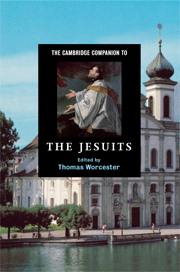Book contents
- Frontmatter
- Introduction
- Part I Ignatius of Loyola
- Part II European Foundations of the Jesuits
- 4 Jesuit Rome and Italy
- 5 The Society of Jesus in the Three Kingdoms
- 6 Jesuit dependence on the French monarchy
- 7 Women Jesuits?
- 8 Jesuits in Poland and eastern Europe
- Part III Geographic and Ethnic Frontiers
- Part IV Arts and Sciences
- Part V Jesuits in the Modern World
- Select bibliography
- Index
5 - The Society of Jesus in the Three Kingdoms
from Part II - European Foundations of the Jesuits
Published online by Cambridge University Press: 28 September 2008
- Frontmatter
- Introduction
- Part I Ignatius of Loyola
- Part II European Foundations of the Jesuits
- 4 Jesuit Rome and Italy
- 5 The Society of Jesus in the Three Kingdoms
- 6 Jesuit dependence on the French monarchy
- 7 Women Jesuits?
- 8 Jesuits in Poland and eastern Europe
- Part III Geographic and Ethnic Frontiers
- Part IV Arts and Sciences
- Part V Jesuits in the Modern World
- Select bibliography
- Index
Summary
Despite subsequent hagiographical embellishment, we know very little about Ignatius Loyola's sojourn in England in 1531 when, as a student at the University of Paris, he visited the island to beg money from Spanish merchants. We know more about the diplomatic mission of Alfonso Salmerón and Paschase Broët, two of Loyola's first companions, to Irish ecclesiastical and secular leaders in rebellion against King Henry VIII in 1541-42, and the activities of two Jesuits sent to Scotland and Ireland by Pope Pius V in the 1560s. The Dutch Jesuit Nicolas da Gouda concluded that only Mary Stuart's marriage to a strong Catholic prince could save orthodoxy. Henry Stuart, Lord Darnley, may not have been the strong Catholic prince that da Gouda recommended but Catholic hopes blossomed after his marriage to Mary. Until Mary had secured Catholicism's position in Scotland, there would be no Jesuit mission. But by May 1568 Mary was under house arrest in England and her infant son James under the protection of a staunch Protestant regent. David Wolfe carried papal letters of introduction to Irish leaders contesting Elizabeth's authority. As Wolfe nominated suitable candidates for Irish bishoprics, two Jesuits operated a small school in and around Limerick. The Englishman William Good was never happy: his continual complaints about the impossibility of religious life in these circumstances, along with increased enforcement of anti-Catholic legislation, prompted his religious superiors to recall the Jesuits in 1570. After a period in prison, Wolfe was on the continent in 1573, seeking Spanish aid for the FitzGerald revolt, which led to his departure from the Society circa 1577.
- Type
- Chapter
- Information
- The Cambridge Companion to the Jesuits , pp. 88 - 103Publisher: Cambridge University PressPrint publication year: 2008
- 1
- Cited by



